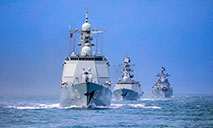Obstacles to U.S. attempt to solidify trilateral cooperation with S. Korea, Japan
SEOUL, March 18 (Xinhua) -- U.S. Secretary of State Antony Blinken and Secretary of Defense Lloyd Austin held a "two-plus-two" meeting with their South Korean counterparts here on Thursday, attempting to solidify a trilateral security cooperation with their Asian allies, South Korea and Japan.
The meeting, the first held in about four and a half years since October 2016, came after Washington's "two-plus-two" meeting with Tokyo, during the first cabinet-level overseas trip by U.S. President Joe Biden's administration members.
Reflecting Biden's diplomacy, the joint statement, announced after the meeting in Seoul, said Blinken and Austin, and South Korean Foreign Minister Chung Eui-yong and Defense Minister Suh Wook affirmed the importance of South Korea-U.S.-Japan trilateral cooperation.
They pledged to continue promoting mutually-beneficial, "forward-looking" cooperation to promote peace, security and prosperity in the region.
However, there are obstacles to the trilateral cooperation because of the underlying historical issues dating back to Japan's colonial occupation of the Korean Peninsula from 1910 to 1945.
The historical grievance came to the forefront again in 2018 when the South Korean top court ordered some Japanese firms to pay reparations to South Korean victims who were duped or forced into harsh labor without pay during World War II.
By the late 1930s, a militarist Japan began to force people on the Korean Peninsula to work in factories and mines or enlist them as soldiers in preparation for the Pacific War. Hundreds of thousands of Asian women, mostly those from the peninsula, were kidnapped, coerced or duped into sex slavery for Japanese military brothels during the war.
The court order triggered a trade dispute between Seoul and Tokyo, leading Japan to tighten control over its exports to South Korea of three materials in July 2019. The materials are vital to making memory chips and display panels, the mainstay of South Korean exports.
In the following month, the two Asian nations removed each other from their respective whitelists of trusted trading partners.
Citing the export curbs, South Korea decided in August 2019 to terminate its military intelligence-sharing pact with Japan, called the General Security of Military Information Agreement (GSOMIA) that was signed in November 2016 to share military intelligence on nuclear and missile programs of the Democratic People's Republic of Korea.
The GSOMIA was considered key to the trilateral security cooperation among Seoul, Washington and Tokyo. South Korea eventually suspended the GSOMIA termination on the back of what some of South Korean media estimated to be pressure from the United States.
"Military cooperation between South Korea and Japan is only an ideal," Kim Jong-dae, a visiting professor at Yonsei Institute for North Korean Studies in Seoul, said in his contribution to the East Asia Foundation.
"South Koreans will not support trilateral military cooperation between South Korea, the United States and Japan," said the former lawmaker of the minor progressive Justice Party who referred to the Seoul-Tokyo territorial dispute over the Dokdo islets, called Takeshima in Japan.
Japan's territorial claims over the islets have angered South Koreans as they are seen as Tokyo's denial of atrocities committed by Imperial Japan during the colonial era.
In January this year, a South Korean district court ruled that Japan should pay reparations to the South Korean sex slavery victims for the first time, leading to Japan's protest against it and worsening the already frayed bilateral ties.
Japan claimed that the 1965 treaty, which normalized diplomatic ties between Seoul and Tokyo, resolved all colonial-era issues, but South Korea said the individual right to damages had yet to be resolved.
Photos
Related Stories
- UN review exposes dark side of U.S. human rights record
- S. Korea, U.S. defense, foreign ministers hold "2+2" talks about Korean Peninsula, regional issues
- Senate unanimously confirms Katherine Tai as U.S. trade representative
- Senate unanimously confirms Katherine Tai as U.S. trade representative
- Suspect in Atlanta shooting spree charged with multiple counts of murder
- Outcry against anti-Asian violence erupts amid ongoing investigation into Atlanta shootings
- NY governor should resign if probe confirms sexual harassment allegations: Biden
- U.S. DHS predicts number of migrant border crossings to reach 20-year high
- Eight people killed in multiple shooting incidents in U.S. state of Georgia
- More COVID-19 fatalities discovered in U.S.: media
Copyright © 2021 People's Daily Online. All Rights Reserved.










